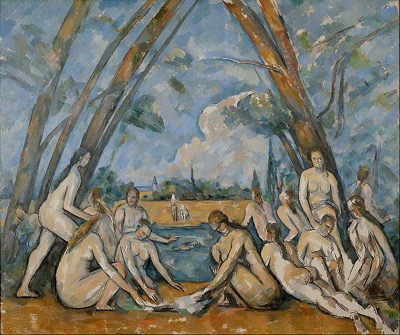Inalienable

Paul Cézanne: The Large Bathers (1898–1905)
"I … prefer to avoid the sure and certain knowledge that I was the one who lost it."
I don't much care about my formal so-called Inalienable rights. The right to bear arms seems about as useful as a right to wear mismatched socks, nothing that won't disclose more than anyone really wants to know about me should I exercise it. The freedom of religion seems less useful than might a freedom from religion, evangelism being one of the more prominent banes of civil society. Nobody needs to save me. The Inalienable rights I care about seem more fundamental than political, more personal than social. I mostly enjoy the Inalienable right to move around my home without having to think very much about what I'm doing. I revere the ready-to-hand, the quirky semi-secret storage spot where I keep my rubber band supply and the place where the toothpicks hide. My world features thousands of such secure stocks to which only I hold the map. Packing disrupts every one of these. ©2021 by David A. Schmaltz - all rights reserved
It might seem a simple matter to clean out a closet. It might seem simple, but it's not, for closets hold a close to sacred order. If they didn't, nobody would ever be able to find anything in them. It's dark in there, so random organization won't work. Each holds a central organizing principle unknown to anyone not frequenting it but second nature to its owner. Empty it, even for a day to facilitate something as simple as repainting in there, and a world expires never to be remade. Repeat this exercise through a kitchen, and a life's permanently disjointed. The painter can blithely request that we just empty all the kitchen cabinets—only for three days, he says—but we cannot crisply comply. I start wondering what subset of the total contents might prove essential during the empty period, for we'll still be cooking dinners and washing dishes; we can't go into total suspension. Which of the many items have just been holding space without seeing much use and which might prove essential in their absence? These are fundamentally unanswerable questions. Nobody knows what's truly Inalienable, what they cannot comfortably live without, until they notice its glaring absence in a moment of extremis.
HeadingHomeward seems a gatling gun of extremis conditions generation, spitting out new ones before the prior ones seem completely expended. We clean out then send out search parties for missing links. I had not consciously noticed how many picky little things I rely upon to keep me placid. The serving spoon never fully appreciated. The plate I'd quite honestly forgotten we still had until it suddenly seemed necessary to use, with no imaginable replacement. Had we a small army of data collectors, we might have developed some means of cataloguing the relative importance of each gadget and configuration, but we rely upon faulty intuition. We never really knew just what we frequently used and what we rarely touched. The most frequently employed items seem the most likely to leave no impression, for they long ago simply faded into foreground. Those unseen foregrounds seem the most likely to be casualties to even the most thoughtful packing. We might well rediscover much when boxing up, but we'll fail to see what will certainly turn out to be the most critically important stuff. Guaranteed.
HeadingHomeward forces altogether too much consciousness upon us. Home is where one need only rarely exhibit much awareness, for a sixth, seventh, or eighth sense hovers close and seems to just take care of us there. The world crumbles for want of only the smallest most innocuous stuff, never for the absence of anything obvious. This riddle has no solution. We must pack blindly and hold faith that we might discover some workable order later, without insisting upon any perfect recreation of any former perfect balance, however imperfect it was. Nothing unsettles like the awareness that those extra senses have gone dark, especially when you know that you're the culprit who put them to sleep. I stand aside and say I'm helping, finding it excruciating to extinguish my recently Inalienable order. I understand that it will not ever return, never again like it was, and so I prefer to find The Muse's fingerprints on the carcass. I can schlep the finished boxes but struggle to fill them up. I will complain when I cannot find the salt but prefer to avoid the sure and certain knowledge that I was the one who lost it. Losing an Inalienable seems unbearable; anticipating that, a lot worse.


